Rebecca Warner's Blog
November 28, 2021
Roe v. Wade: "A Chill Wind Blows"
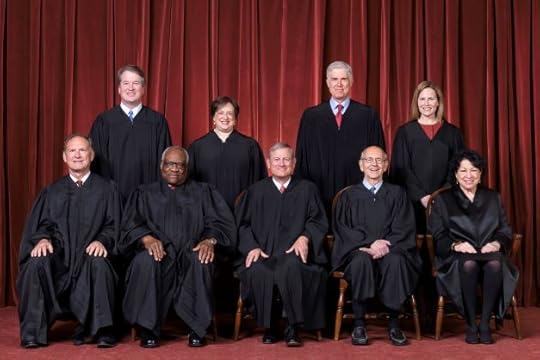
In the summer of 1989, I stood at my kitchen counter, reading The Miami Herald and sipping my coffee before heading to work, when I came upon an article that said the governor of the state of Florida was planning to call a special session of the Florida Legislature to act upon a recent Supreme Court ruling that opened the door for states to enact stricter abortion laws and regulations.
Something snapped in me. My thought was, Wonder if he had a mistress and she got pregnant. How would he feel about abortion then?
The idea for a book germinated on the spot. What if an anti-abortion governor's mistress became pregnant, and her pregnancy threatens to derail his life, as unintended pregnancies have derailed the lives of so many women? What actions would he take to rid himself of an unwanted pregnancy?
Two years later, with my husband's blessing, I retired from my lucrative job as a VP in private banking at one of the largest banks in Miami, and spent the next nine months writing Moral Infidelity.
The premise: An anti-abortion governor who has built a successful political career on a platform of morality has an affair which results in an unintended pregnancy. His mistress wants him and his baby, and threatens to ruin his life if he doesn't leave his wife and marry her. Choice takes on a whole new meaning for the governor when the loss of everything that defines his life is on the line.
I did a great deal of research on both sides of the abortion issue to keep it balanced, but the real story is a thriller with twists and turns as the noose tightens around the governor's neck.
Two publishers showed real interest in Moral Infidelity. It even got as far as the editorial board at a large publishing house before being nixed. Dejected, I shelved the book and went on to do other rewarding and meaningful things with my life, including 14 years of caregiving for my parents.
After my parents passed away, I dusted off the manuscript, did some serious editing, and self-published Moral Infidelity in 2014. It did well in sales; it won two awards; it got amazing reviews. And that was that.
Now, six-plus years and three books later, Moral Infidelity is being republished on 1/11/22 by my publisher, Black Rose Writing. I'm thrilled, but I'm also disgusted that a woman's right to make decisions about her own body is still being legislated.
The book is set in 1989, the year that the SCOTUS decision in Webster v. Missouri Reproductive Rights signified the first key break from Roe v. Wade.
A bit of history:
In Roe v. Wade (1973) the Supreme Court of the United States ruled 7-2 that the right to privacy under the due process clause of the 14th Amendment extended to a woman's decision to have an abortion. The Court ruled unconstitutional a state law that banned abortions except to save the life of the mother.
The decision placed the government's interest in protecting women's lives and health over and above the government's interest in protecting the potential life of a fetus, and established the right of every woman to make her own decision about whether or not to have an abortion.
In the years following, the Court heard various challenges, but not until June 30, 1980, did the first blow to Roe occur. In Harris v. McRae, a closely divided Supreme Court upheld the Hyde Amendment, which prohibited the use of federal funds for abortions.
Then on July 3, 1989, in Webster v. Missouri Reproductive Rights, the Court upheld a Missouri state ban on the use of public employees and facilities for performing abortions, effectively reversing course and demonstrating that Roe was not necessarily settled law which restricted future revisions.
Three of the Court's majority--Rehnquist, White and Kennedy--recommended revisiting the Roe decision, while Justice Scalia even suggested that the Court overturn Roe.
Speaking for the minority, Justice Blackmun wrote that the ruling made clear that, for those who support Roe, "a chill wind blows."
1989. Consider that Roe has stood for more than 32 years from the time I stood in my kitchen, reading that article. The battle since then has been fierce, and Roe has been repeatedly wounded and diminished, but organizations like Planned Parenthood and NARAL, and politicians and jurists who believe in a woman's right to have autonomy over her own body, have held off the actual demise of Roe v. Wade.
But the most serious threat to Roe is just days away from being heard by SCOTUS. Thomas E. Dobbs, Mississippi's state health officer, is the named petitioner in Dobbs v. Jackson Women's Health Organization. In its brief to the Supreme Court, Mississippi asked the justices to overrule Roe and the court’s 1992 decision in Planned Parenthood v. Casey, which said states could not impose an “undue burden” on the right to abortion before fetal viability.
The Mississippi law bans abortions if “the probable gestational age of the unborn human” is determined to be more than 15 weeks, with narrow exceptions for medical emergencies or “a severe fetal abnormality.” The state says that the fetus has made important physiological developments by 15 weeks, and that abortions are riskier to the mother at this stage of pregnancy. The Jackson Women’s Health Organization, which as the sole abortion clinic in Mississippi is at the center of the case, gave evidence to a federal appeals court showing that fetal viability is impossible at 15 weeks.
Although the court is not likely to rule on the Mississippi law until June, the makeup of the court with six conservative justices gives pro-choice advocates every reason to believe that this may very well be the end of Roe. This conservative majority has been decades in the making. The Christian right, an informal coalition formed around a core of conservative evangelical Protestants and Roman Catholics, has been fiercely persistent in fashioning the court's conservative make-up. But even they admit they never dreamed of having a staunch ally in a position as powerful as President of the United States--until Trump readily embraced that coalition, which could deliver millions of votes.
In 2016, VP Mike Pence portended what is a now a very real and stark possibility: “If we appoint strict constructionists to the Supreme Court as Donald Trump intends to do, I believe we’ll see Roe v. Wade consigned to the ash heap of history.”
Aided by Mitch McConnell's unabashed and unashamed hypocrisy, Trump did just that, and made the Christian right's dream of a rock-ribbed, Republican-leaning court come true.
Division of church and state has never been so blurred. Six of the Supreme Court justices are Catholic--two thirds of the Court, while only twenty-two percent of the US population is Catholic. We may never return to the days when the two are deemed separate. We will never have another Republican as clear on the need to do so as Ronald Reagan was when he said in 1984, "We establish no religion in this country, we command no worship, we mandate no belief, nor will be ever. Church and state are, and must remain, separate."
Which makes what Justice Blackmun wrote in the Webster v. Missouri ruling from 32 years ago even more likely: For those who support Roe, "a chill wind blows." In today's vernacular, we might even say, "Winter is coming."
April 1, 2021
Part II: When Is It Time To Take The Keys Away?
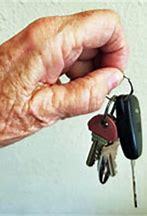
After Dad passed the state-required competency test, he continued to drive. That was in March of 2002. Mother passed away in April, 2002. The live-in, Josephine, continued to stay in their home, looking after my bereaved Dad. Whether it was the stroke, aging, grief, depression or the beginning of Alzheimer's, Dad could not remember to take his medicine. The live-in remained until July, 2002, when Dad moved into a lovely assisted-living facility. Okay, let's be honest, I moved him into the facility.
My husband and I were getting ready to go to our summer home in North Carolina for four months. After nine intense months of caregiving for my mother, I was looking forward to the beauty and peace of the mountains. The situation with the live-in had run its course, and it was time to get Dad into a facility that could not only look after his physical needs, but become a place to make new friends and hopefully begin to recover from his deep mourning of his departed wife.
Dad became "Mr. Popular" very quickly because he was handsome and kind and funny and affable and, oh yes, he had a car! I was alarmed when one of the staff told me he and two other male residents had "gone to a bar on the beach and didn't get back until midnight." On the one hand, I was glad Dad was enjoying time out with friends. On the other, I had bleak visions of his driving back across the bridge from Jensen Beach to the mainland at midnight after having a couple of drinks.

The Jensen Beach Bridge!
Still, despite his dementia, Dad was functioning well and I didn't want to restrict his fun by taking away his keys. It's difficult being a Health Care Surrogate because you're responsible for making decisions that ensure safety and quality of life. It's even more difficult, however, to be a child trying to control her dad's life, even if it's for his own good. He continued to drive for the first two years he lived in the assisted living facility with no problem.
Before Mother passed, she and Dad would drive up from Florida to visit us every summer in North Carolina. After Mother passed, it made more sense for Dad to fly. Though Dad was still driving, I couldn't fathom his driving to the airport and finding his way to the right gate. So I found a wonderful man in Florida who, on behalf of distant families, took care of elderly patients' needs in many areas. He would drive Dad to the Palm Beach airport, and with a special pass, get him all the way to the boarding area and on the plane. I met Dad on the other end, and when he was ready to fly back to Florida, I used a special pass to make sure Dad boarded safely. Then the driver met him as he deplaned in Palm Beach. He would drive dad to the assisted living facility, even carrying his luggage up to his apartment. It was in 2004, the third year of doing this, and after speaking with the driver, I followed my routine of calling the assisted living facility to confirm Dad was safe and happily ensconced in his lovely apartment.
So imagine my shock when I received a call less than an hour later from a state trooper telling me that my dad had been in an accident. He wasn't hurt, the trooper said, but he had jumped a median and wiped out four cars. WHAT?! I had gone to the trouble and expense to make sure Dad was driven door to door, and yet he had grabbed his keys and headed out as soon as he got back.
Fortunately, only one person was slightly injured and taken to the hospital by ambulance. But Dad's sturdy Ford Crown Victoria--the very same kind that was the vehicle of choice of police departments--had protected him from injury.
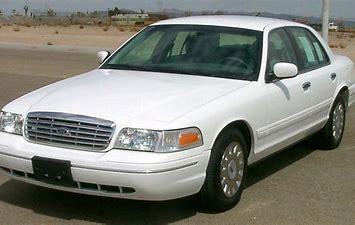
What can you do? I thought to tell Dad that the insurance company would no longer insure him after such a costly accident, but that would have been a lie. He had a guaranteed renewable policy. So his car was repaired and he still had the keys. He was a danger to himself and others, however, so I had to make the very hard decision to take him to his neurologist, then afterward, get the doctor sign a form saying Dad was no longer able to drive.
I was the bearer of that bad news. I didn't mention the accident in the telling; I simply told him the doctor diagnosed that his Parkinson's was advancing, and it was beginning to affect his motor control skills, which could prove dangerous in driving a car.
It was obvious Dad was shattered, but he was stoic. He said he wouldn't want to be responsible for hurting anyone. But here's the thing: Growing older and having afflictions means your independence and dignity are taken away one bite at a time. This was a tremendous blow to Dad's sense of capability, independence, and self-esteem. I took Dad's set of keys but didn't sell his car right away. I realized later this was probably a bad move. He could see it sitting in a parking spot, but he didn't have the keys to get it going. He would call me and tell me he lost his keys, forgetting or pretending to forget he couldn't drive. That just extended his mourning period for his loss of freedom.
The assisted living facility had a bus for transporting residents to doctor's appointments and taking them on outings. But to Dad, riding that bus had the same impact as getting hit by a bus.
Back in Florida for the winter, I was able to drive the hundred miles from Miami to Port St. Lucie to take Dad to his appointments. And what luck that I found another Helper named Patty, who looked an awful lot like me, and who became Dad's driver for wherever he wanted to go.
I realized that taking his license away and selling his car didn't have to mean the end of outings. It just meant he had to get where he was while riding in the passenger seat, rather than being in the driver's seat. And in a short amount of time, he came to like being driven.
Every such incident of taking away the keys will be different, but it will always be stressful. We make many hard decisions when we are looking out for our health-compromised parents, and this is just one more. I found that using a doctor's diagnosis to explain the reasoning for difficult actions is the best choice, and it lets us off the hook in terms of being blamed. In that way, we're still able to take care of our loved ones without hard feelings hanging over us. It's just another part of doing one of the hardest jobs we'll ever have to do, where some of the best tools we can use are compassion and the maintaining of dignity. That, and unfailing love, are what caregiving is all about.
March 15, 2021
When Is It Time to Take the Car Keys Away?

When my dad was diagnosed with Alzheimer's, he was in the mild cognitive impairment stage. People with mild cognitive impairment (MCI) have mild changes in their memory and thinking ability. These changes aren't significant enough to affect work or relationships yet. The trip to the doctor for testing that will render a diagnosis of dementia most often occurs when it becomes clear to family and doctors that a person is having trouble with memory and thinking that impacts daily functioning.
My dad's ability to drive was questioned even before he was diagnosed with dementia. Dad had a stroke while my mother was spending three months in the hospital following open heart surgery and myriad hospital errors that kept her there. Though he was staying with me at the time because Mother was in a hospital in Miami, where I lived, I didn't immediately realize he had suffered a mild stroke. But as his Health Care Surrogate, I was responsible for his health and wellness, and certain things about his behavior and recall caused me enough concern to take him to a neurologist, fearing that dementia was setting in.
After I got the diagnosis from the neurologist, I said to him, "Good news, Dad! You don't have Alzheimer's, you just had a stroke."
He looked at me and said, "Huh. That's like saying 'you didn't get hit by a bus, you just got hit by a car.'" Because Dad could still come up with humorous retorts like that one, I didn't worry too much about his overall mental health. An aside: His sense of humor was his last personality marker to submit to his Alzheimer's.
But when all treatments and facilities had failed to restore my mother's health, and it was time to bring her home where she longed to be, Dad slowly became more disoriented. Looking back, I can largely chalk that up to his grappling with the reality that his wife, whom he loved very much, was dying. This dawned on him in stages. She never walked again unassisted. She had an oxygen tank going twenty-four hours a day. Hospice was coming in twice a week to assist. In addition to hospice, I hired a wonderful live-in who took care of Mother and as time passed, Dad, as well.
This angel of a caregiver, Josephine, stayed six nights a week. On Sunday mornings, Dad would drive her home and then return on Monday to pick her up. I lived a hundred miles away from my parents, and though I was at their home three-to-four nights a week, I needed to be with my husband in my home, too--especially on weekends, when he wasn't working and we could catch up on everything that made our marriage such a wonderful one.
One day I walked into my parents' home to find my dad overwrought. He handed me a letter he had received "from the government" which said it had been reported that he should not be driving, and he was required to come in for a test to determine whether or not he could retain his driver's license. This spelled disaster in so many ways. Josephine couldn't drive because she had never learned how. Dad was the one who had to run errands and grocery shop. He had to drive Josephine home and pick her up each week. Without a license, their structure would collapse.
Though I never knew where the accusation came from, I feel certain it was one of the hospice aides who watched my dad disengage when mother was getting treatment and personal care. He was in denial, and his actions reflected those of a man removed from his current reality. I remember dad being in a sort of stupor much of the time. While I recognized it as coming to terms with Mother's impending demise, a hospice worker in a two-hour visit saw it as something more organic.
In that letter, Dad was given an appointment date for his evaluation, and of course I was the one who took him. From the day he received the letter, to the day of the appointment, there was a great deal of fear and consternation on both Dad and Josephine's part. We all sat down together to say prayers that he would be of clear mind the day of the evaluation, and that God would guide and comfort him.
I wasn't allowed to be in the room with Dad while he was taking the exam. When the door opened, Dad came out with a smile on his face. The interviewer followed him out and spoke with me, telling me that Dad had done very well. But was rubbing his chin as someone who's wondering if they "missed something" might do. He then said, "Compared to the people who usually come in here, he's in good shape."
"So he can keep his license?" I asked. There was a moment of hesitation when my heart clutched. The interviewer was still considering revoking his license because the complaint had come from a reliable source. I decided to pull out the ace I had been holding and play that sympathy card. "Sometimes he's disengaged, but I believe that comes more from lying beside his dying wife every night."
Dad kept his license, and I handed him the keys to drive home. He was one happy fella!

On the way home, I praised him for passing the test with flying colors while reassuring him it was the silliest thing in the world he had even been reported. Though he was greatly relieved, he was still shaken at the prospect that someone could take his license away.
In time, that someone would be me.
Next week:
Part Two: When Dementia Patients Become Dangers to Themselves and Others
January 18, 2021
ISOLATION FALLOUT FROM A to Z
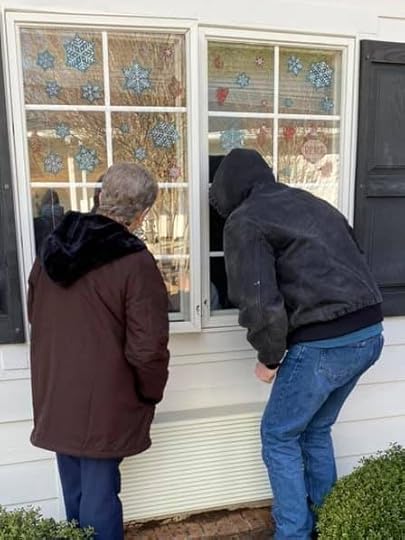
Imagine if for ten or more months, you were only been able to visit with your loved one in a long-term care or assisted living facility through a window.
Wonder if each time you visited, you found your loved one mentally and physically declining in ways that are obvious to you, but ignored by facility employees.
Try to picture your loved one with dementia reaching out to you, wanting a hug, yearning for a tender touch, and crying because you won't oblige.
After six months of his mother's being in isolation, Bill Borrelle finally got to see her in September. As a member of the Facebook group Caregivers for Compromise - because Isolation kills, too, Bill appeared on that site in a video on January 16, 2021 to share a list from A to Z of the areas in which his mother's mental health and well being had been impacted according to his experience in observing his mom. Note that she is legally blind.
Bill asked everyone to share his list, so I'm doing it here.
Anxiety
Boredom
Confusion
Dementia acceleration, despair, depression
Eating very little
Fall due to loose shoes
Eating very little
Gastroenteritis
Hearing aids not working
Inability to remember
Jail sensation
Keeps asking why I don't come in
Loneliness
Mold in fridge
No exercise
Overgrown fingernails
Persistent phone calls
Quests to be with family
Refrigerator without favorite snacks
Sleeping all the time
Ten months not going out
Unhappy
Very little social interaction
Weight loss
X-treme fatigue after getting and surviving COVID 19
Yearning for a hug
Zero visits from grandchildren and great-grandchildren
In less than a year, the Caregivers for Compromise Facebook group has grown to over 14,000 members, the great majority of whom are committed to changing their loved ones isolation by getting permission to visit in person. After all, they're willing to follow all protocols the facility has in place, but they have repeatedly been told they cannot have in-person visits.
But this group's efforts have had some astounding results. Lawmakers and Departments of Health and Human Services in some states have now recognized that, beyond being a welcome visitor, many family members are critical partners in the ongoing care and physical and emotional support of people living in nursing homes and assisted living facilities.
In some cases, they have designated these people as Essential Caregivers, noting that the goal of designating Essential Caregivers is to help residents who are missing care previously provided by a loved one or outside caregivers. An essential caregiver may be a family member, friend, personal private caregiver, or volunteer who was providing care before the pandemic and/or who needs to start providing care now because there has been a change in the patient’s condition and they now need care.
It's a great start, but there may be those who are thinking that more administrative action won't be necessary because with vaccines being administered, things will return to normal in terms of visits. But there are more impediments that mean those longed-for visits won't happen as quickly as everyone involved would like.
Some comments on Caregivers for Compromise explain why that is so:
"Here in NC there's no telling when mom's nursing home will open up. After the vaccine is given to the patient, the whole facility, employees and residents have to be Covid free for 30 days. The county is a hotbed. What are the chances no one will get Covid for 30 days. I'm heartbroken. Our loved ones are suffering greatly."
"Here on Long Island in NY, my Moms a resident in a Nursing Home and is actually due to receive her 2nd dose of the vaccine this coming week. HOWEVER, we have ALL been informed that until such date that the ENTIRE facility (BOTH residents AND staff) are 100% vaccinated, there is NO FORESEEABLE date for their lockdown to ease. That said; MANY employees as well as residents have refused the vaccine, so who knows when or if this nightmare will ever end for ALL of us. Its beyond heartbreaking, truly cruel at this point and inhumane already."
A number of those who have been able to do so have removed their loved ones from those places and brought them home, which can entail difficulties and adjustments for everyone. But that's not an option for many, and so the efforts to make in-person visits possible will continue.
And for every day that is so, isolation will continue to kill.
But I can't end this blog with that sad and scary prediction, so I'll end with this happy story of a woman who was able to take her mother out of the nursing home and bring her into her own home to live.
Here is what she posted about that on Caregivers for Compromise:
On November 20 my 91 year old wheelchair bound mother left her retirement community of 20 years (assisted living the last year) to live with me in an effort to keep her safe from Covid. It has been a difficult 6 weeks- exhausting, frustrating and a million other emotions. Being isolated in temporary housing because my home is not handicapped accessible has been making me a little crazy and maybe depressed, especially over 2 holidays but having her with me is all worth it, today especially. We got out of the house and went to Starbucks! My Mother’s first Peppermint Mocha DECAF latte- she loved it! She’s so darn cute sitting there drinking her Starbucks!
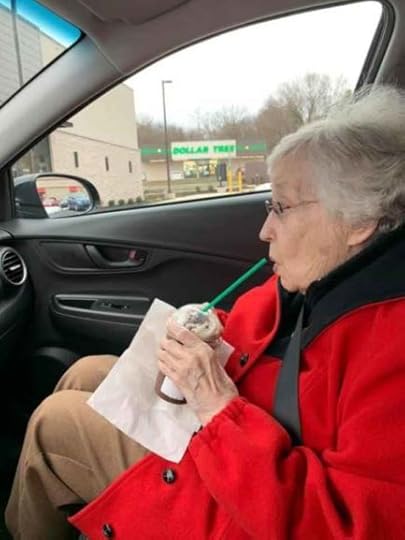
December 18, 2020
Caregiving: The Importance of Good Communication Skills
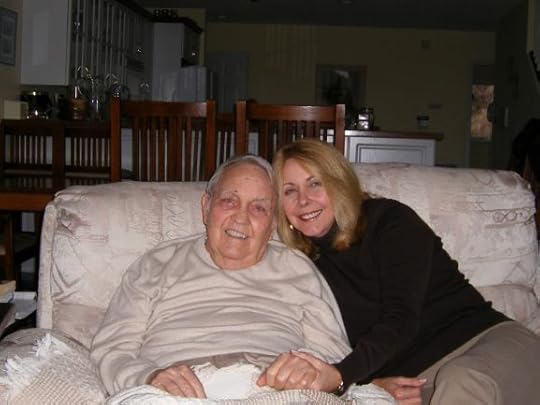
There’s no doubt dementia diminishes the ability for effective communication between the patient and caregiver. When people can’t comprehend what is being said, or can’t find the words to express their own thoughts, it can be painful, embarrassing and frustrating.
How a caregiver sets the tone for the conversation can make all the difference between being gratified and exasperated.
Think about how you are presenting yourself. Are you frowning? Tense? Expecting the worst? Bossy or controlling? People with dementia are often extremely aware of nonverbal signals. In my book, My Dad My Dog, there’s a scene in the first chapter where Joe, Rachel’s Alzheimer’s-afflicted Dad, has had the “presence of mind” to answer a question posed by a resident of the care facility where he lives. Unbeknownst to him, this causes Rachel embarrassment. He looks at her, pleased that he was able to answer, but her reaction is not what he expected.
Told in the first person, this is how Rachel describes the resulting dynamic:
I brush at the non-existent lint on my pants and look over at Dad, who is smiling at me. He’s pleased he was able to answer Grady’s question. Then he looks at me, really looks at me, and his smile disappears. The corners of his mouth turn down and his eyes dull.
He’s aware of my distress. His shaky hand reaches for mine. He wouldn’t be able to describe what I’m feeling, but he senses it. He doesn’t think clearly, but he feels deeply; and at this moment, he wants to comfort his daughter.
Sometimes things can be said to an Alzheimer’s patient that cause an unexpected shift in mood, and the patient can spiral down from there. A caregiver can just be physically and mentally tired, and might say no to a request, or order him to do something, but that often brings about a bad result, most often stubbornness or resistance or a bout of “shutting down.” There are ways to overcome a possible downward spiral, including humor, cajoling, or cheerfulness. Humor or gentle teasing often helps caregivers through difficult moments. Here’s a scene from the book that describes how Rachel deals with her dad’s response to her refusal to give him a beer.

“Can I get you anything, Dad?” I call from the kitchen.
“A beer.”
“Too early in the day. Plus, it will make you have to go to the bathroom all afternoon.”
I hear him grumble, but I’m not going to put myself, or him, through the effects of a beer so early in the afternoon.
I wait to see if he says anything else, but when he doesn’t, I go back to peeling potatoes.
“Hey, Dad, remember what you told me about how I peeled potatoes?”
There’s no response, so I walk into the living room, holding a peeled potato. He won’t look at me. Is he being petulant over a beer? How aggravating. I just want to turn around and go back into the kitchen, but I don’t want his mood to descend any further.
So I cajole him. “You used to say I peeled them so much, they looked like marbles when I got through with them. Remember that?”
Still no response.
Standing directly in front of him, I show him the potato. “Now look at this one. If you hadn’t shown me how to peel a potato, we’d be having marbles for dinner.”
There’s a long pause before he responds. “I peeled enough of them in the Army.”
“And you learned to peel them perfectly. Thanks for passing that on to me.”
Mollified, he starts digging into the box of crackers again.
Being a caregiver requires learning on the job. One has to find out what works with her loved one, and build upon those skills that keep communication open.
In Part II, I cover more about approach and tone through using more excerpts from My Dad My Dog.
November 17, 2020
BECOMING AN IN-HOME CAREGIVER
"I had a talk with the administrator of my Mom’s facility today. I told her I was coming to get Mom on Friday. I’m taking her out. Taking her home. Those are some of the best words I have ever said. I just finished her bedroom today. I am so excited for Friday. My heart aches for those of you that cannot take your loved ones out. I have struggled all these months. Sleepless nights. Knot in my stomach. So many tears. I know it won’t be easy. But, I’m doing it. I’m doing it." From a member of Caregivers For Compromise
[image error]
A room for Mom...
Relatives of loved ones who live in long-term care facilities, such as nursing homes and assisted living facilities, are taking their parents, siblings and grandparents out of those facilities and taking on the enormous task of becoming their caregiver within their own homes.
One obvious reason is because of the high number of COVID-related deaths that have occurred in those facilities.
As of the latest reporting on November 12, 2020, these are the number of CDC reported cases:
RESIDENT CASES AND DEATHS:
Total COVID-19 Confirmed Cases: 294,438
Total COVID-19 Suspected Cases: 156,929
Total COVID-19 Deaths 65,446
With the projected escalation of the number of COVID-related cases and deaths throughout this next coronavirus surge, we can expect to see even more residents being taken out of nursing homes.
But there's another reason for the escalation of in-home caregiving. Many have not been able to visit in person with their loved ones for what is now almost nine months. They have only been able to visit through panes of glass. But it's not enough; not nearly enough.
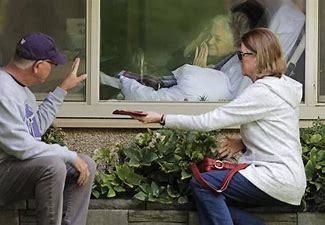
Not being able to hold their loved-one's hand, kiss their cheek, comb their hair and say, "I love you," in person has taken a toll on everyone's emotions, but it has also taken a huge toll on the health of those residents who have been totally isolated in their rooms for months. Many suffer from dementia and cannot understand why those in-person visits have stopped or why they can't go to the dining room or visit with the friend next door.
Progress was being made in changing this through appeals to state governors, and visiting restrictions were beginning to lift, albeit on a very restricted basis. Now, with COVID-19 cases expected to surge through these dark months of winter, we can expect more people to be bringing their loved ones home.
Perhaps the much-needed, highly anticipated vaccine can turn this entire situation around. That's the very best outcome for those who are separated from their families. And that's the outcome we should all wish for. Until then, many who have no training and no experience--those who can find any possible way to do so--will become caregivers in their homes. As we can tell from the poignant opening paragraph of this article, they understand the challenges will be great, but the rewards will be greater.
October 28, 2020
HOW CAREGIVERS FOR PARENTS WITH DEMENTIA CAN IMPROVE COMMUNICATION
Children are moving their dementia-afflicted parents out of long-term care facilities due to fears about COVID-19’s high fatality rates, and/or because they recognize that imposed isolation is accelerating their parents’ cognitive and physical decline.
In becoming the primary parental caregiver, children also become the primary communicator, which can present complications and frustrations that soon become overwhelming.
One of the most challenging aspects in dealing with loved ones’ cognitive decline is learning how better to communicate when their ability to express themselves diminishes as their dementia progresses. We have, after all, been the child who communicated with our parents in a certain way for decades. Learning to speak as the adult without offending our parents’ sensibilities can mean walking a fine line and adjusting our expectations.
The Alzheimer’s Association has some excellent advice about communication, and it’s a great resource for understanding what to expect and incorporating its recommendations into your personal situation.
My dad’s Alzheimer’s was the slow-progressing kind, so his changes in communicating came in stages and over time, unlike fast, severe dementia which removes the ability to speak at all. In Dad’s case, the changes had a tendency to surprise me when I realized, for instance, that he was losing his train of thought much more often. Or that he took longer to respond because he was trying to organize his words logically. A later-stage change for Dad was trouble in finding words. Instead, he might use familiar words to replace lost words, so that a word such as “skillet” became “plate.”
But over time, with research, advice and practice, I found ways to facilitate communicating with Dad.
Dad stayed better focused when I looked like I was really listening: I’ve always been a good listener, so I didn’t have to pretend; but I admit it was difficult at times to stay focused. When that happened, I looked directly into his pretty blue eyes to let him know I was interested, no matter how long it took him to say what he wished to say.
I also learned to focus on feelings when the words weren’t there. When Dad couldn’t verbally express himself, I focused on feelings conveyed through his body language. I entered his apartment one day and, seeing he was napping, changed the channel on his TV. He sort of grunted, and when I looked at him, I saw his eyes were still closed but his jaw was set and his teeth were clenched. He was irritated, but he either couldn’t summon the words to tell me that, or he didn’t want to offend me. I hit the “previous” button on the remote and his show came back on. His features completely relaxed as his irritation dissipated.
Using his name when addressing him is something I asked everyone, including the caregivers in his assisted living facility, to do. Not sweetie or honey, but Joe. I often used “Dad” to begin or end a sentence. Being addressed directly by Dad or Joe helped him maintain attention and orientation.
Treating him with respect was easy enough to do, because I respected him greatly. But at times I had to resist the temptation to talk down to him when he was being what I thought was petulant or obtuse. I had to remind myself his behavior was due to his dementia. Since many individuals with Alzheimer’s feel that the illness has robbed them of their adult status, talking down to them or talking about them as if they aren’t there diminishes their already-eroded sense of self-respect. I learned to overcome that impulse, but it was much harder to get others to do the same. Busy doctors, for instance, just wanted to speed things up by talking to me directly about “him.” I respected their time, but including Dad in the conversations as much as possible gave him confidence that he was still being seen as an independent adult.
It’s difficult to get out of the habit of asking questions such as, “Do you need to go to the bathroom?” It may seem like a simple question that should yield a simple answer, but for someone in a wheelchair or who has problems ambulating, going to the bathroom is a chore. There might be hesitation in responding. By saying instead, “Let’s get you to the bathroom before dinner,” the decision was made for him.
In that same vein, asking more than one question in the same sentence—in effect giving him choices—caused confusion. “Dad, do you want to have lunch here or at a restaurant or take a ride on the Parkway first?” didn’t work nearly as well as saying in a calm, relaxed tone, “Let’s go get a hamburger before we take a ride on the Parkway.” I learned to choose my action verbs more carefully, too. Phrasing as simple as, “Let’s hop in the van,” might be taken literally—he might think he had to hop to get into his handicapped van. From where he sat in his wheelchair, that wasn’t possible for him to accomplish, and it could bring on anxiety.
These are techniques that worked really well for me and my dad, but there are others you might find work better for you. Mayo Clinic provides even more suggestions for effective communication.
Patience, biting your tongue, searching for and practicing better ways to get through to your parents, and accepting and adjusting to their ever-changing way of speaking can be frustrating. But doing the work and getting positive results, no matter how small, can make your efforts immensely rewarding. By using these techniques, I kept in touch with Dad longer than I thought possible.
There were times we both became agitated and weary, but neither of us stopped trying. And the words, “I love you,” so often conveyed all we really wanted and needed to say when other words failed us.
October 19, 2020
Caregiving Comes at a Cost: Should Family Members Be Compensated for Caregiving?
We’re a nation of busy, burdened people. Holding home and hearth and body and soul together during this turbulent time takes more energy than we ever thought we could muster.
July 17, 2019
The 2020 Vision of Oprah as President
 24619360 – u.s. president barack obama, first lady michelle obama, caroline kennedy, former president bill clinton, talk show host oprah winfrey listen to the national anthem during the let freedom ring ceremony at the lincoln memorial august 28, 2013 in washington,
24619360 – u.s. president barack obama, first lady michelle obama, caroline kennedy, former president bill clinton, talk show host oprah winfrey listen to the national anthem during the let freedom ring ceremony at the lincoln memorial august 28, 2013 in washington,On Friday, May 3, when one of Bill Maher’s guests suggested Democrats needed “someone larger than the president” (not in waistline, in stature) Bill Maher said, “I’ll tell you who.” He then told a story about going to a party “way up in the Hollywood Hills,” where every guest had to valet park at the bottom of the hill and take a shuttle bus to the top. Many “A-listers” were resisting until someone said, “Oprah took the shuttle,” which led to everyone, without further protest, getting on the shuttle bus. Point made.
But what if she did?
He went on to point out that she doesn’t scare people, she’s more popular than Hillary, and she’d certainly get the black vote. But, as another guest pointed out, she’s not running.
Oprah’s speech at the Golden Globe Awards of 2018, where she received the Cecil B. DeMille award, was about equality, dignity and speaking your truth, with specific reference to women. That speech sparked calls for the former talk show host to run for president. Though that seems unlikely, let’s speculate, along with Bill Maher, why she would win if she did.
Bill said, “she doesn’t scare people,” but let’s add to that; she isn’t scared of anyone. What can Trump throw at her? He certainly can’t deride her lack of political experience, since he’s the goblin of mediocrity in that respect. Her non-political background is actually to her benefit. We won’t be hearing about mistakes and misjudgments (real or manufactured) made throughout a lengthy political career. Trump won’t be able to dig up meaningful dirt on her since she has already exhumed her past and shared it with us on national TV.
He would be at a loss to give her a nasty nickname. (Crooked Hillary, Low-Energy Jeb, Pocahontas Elizabeth, Little Marco, Crazy Biden). If he cast a single aspersion on any aspect of her physical appearance, intelligence, or heritage, he will suffer for it.
But President?
Oprah’s speech at the Golden Globes was the unchallenged highlight of the evening. There she was, an icon who was saying the words that had to be said, in a tone that resonated with strength, not rancor, and at a time when we most needed to hear them. To hear once again a well-spoken, knowledgeable orator, who told the unvarnished truth without rubbing us raw, was like drawing in a breath of fresh air and having it fill our deflated selves. Her speech was reminiscent of those of Barack Obama, who not only made sense, but made us think.
Some could say that we are just hungering for a well-spoken person to state things in a dignified manner. I often hear and read comments that lament the loss of a president who was thoughtful, intelligent, and articulate — and Oprah, true to her character, was certainly all of those things at the Golden Globe Awards.
But President?
The parallels between the two might lead to the conclusion that if anyone can do the job, it’s the woman who did as much as anyone to put Obama in office.
Oprah Winfrey bridged the divide between black and white, rich and poor, classy and trashy in this country for more than 25 years. She embodied the sentiment of Rudyard Kipling’s formula for success, foremost among them:
“If you can talk with crowds and keep your virtue, Or walk with kings — nor lose the common touch…”
From residents of the ghettos to residents of Buckingham Palace, Oprah connected with all on a humanitarian level. More than that, her personal success dispelled a lot of racist and misogynistic misconceptions. As a black woman, she was able to achieve every goal she set out to achieve. She helped millions believe they could, too. She lifted us up. That’s what good leaders do.
But President?
“I’m Every Woman,” her theme song for years, induced women of every color and nationality to consider that, inside, we are in fact the same. Our skin color is different, but we harbor many of the same goals, dreams, challenges, disappointments, and the desire to better our lives. Oprah blurred the lines in the coloring book, so that we all bled out onto the same page, making a much more interesting and beautiful picture.
I have long believed, and told anyone who would listen, that without her helping us to see that blurred lines can result in a more beautiful picture, Barack Obama would not have been elected president.
She saw his potential and cultivated his image. She announced on her show, with an enthusiasm we got caught up in, that she was supporting him for “President of the United States!” She had been laying the groundwork for the acceptance of people of color in powerful positions, with her being the most worthy of not only our acceptance, but also our admiration.
So when she pushed Barack Obama’s face into our TV rooms, in living color, and said, “This man!” we believed in him also. She had convinced us over many years that anything was possible, so why couldn’t a black man be president?
We trusted her. We knew she was smart. We knew she overcame adversity and used steely will and determination to build an empire. We admired that she had a glamorous life, but was enormously philanthropic. And she accomplished all of this wearing black skin and having breasts. Oprah shut down our excuses for, “I can’t.”
And that’s what she did again at the Golden Globes. The worldwide reaction to her speech underscores how much power, sway and admiration she still holds in the world. We missed her, and we wanted to embrace her again.
But President?
Oprah also reminded us that graciousness, intelligence and strength are what we are deserving of in a leader. She looked and sounded like a leader because she is a leader, but she also knows that there are other really smart and capable people who can advise her, as they’ve done in her rise to wealth, fame and power; and she’s not an egomaniac who would ignore that advice.
Does that mean she would make a great president? Let’s ask ourselves: Do we really want someone who is not political in the sense that she knows how to work the gears in D.C.? Do we trust that she could be as brilliant in running the government as she has been in building and running her empire?
Most of all, would she earn our respect as president, just as she earned it as a mogul?
There are some parallels between her and our current president (ouch, quit throwing stuff, hear me out!) Both are well-known public figures, famous for different reasons, but still famous. Both have absolutely no governing experience. As far as wealth, Oprah’s is real and she can afford any lifestyle she wants. Trump’s wealth is…questionable, but he had access to an opulent lifestyle. So we have to wonder what would drive them to want the headaches that come with that office.
But President?
But it’s the divergence between Trump and Oprah that goes to the core of their characters that makes her a much better choice for president: Oprah wants to unite us; Trump wants to divide us. If Oprah were to run for that office, it might be because she sees a need to bring the country back together, and all that that includes and implies. That’s what she’s done throughout most of her remarkable life. She used the power of her platform to transform the racial, sexual and even the political landscape. She helped empower millions of women from every walk of life, and she knows that those women — because of powerful, misogynistic male politicians — are on the brink of losing their empowerment. She knows we’re sinking back into the quicksand of racism, and we need someone to pull us out before we’re pulled down so far into that gritty vortex that we can’t be rescued.
If Oprah can work her special magic in bringing us together again, then she would be an ideal president because that’s what we need here, now, again, more than anything else in this country — unity, inclusion, and acceptance of diversity. She may not have the political experience, but she has more people experience than possibly anyone on earth. And that’s what the governance of this country is meant to be: Governance of the people, by the people, for the people.
We want our welfare (a life in which we fare well — healthcare, clean air and water, living wages) to be the central consideration of the government; and in that respect, Oprah’s looking mighty good as being the person to give us what we want.
But President? Maybe so.
May 23, 2018
Who Do You Trust With Your Life?
Health Care Surrogate. Medical-system navigator. Caregiver. Advocate. Decision maker. Cast about in your mind and ask yourself, “Who will be this person for me when I need them?"



